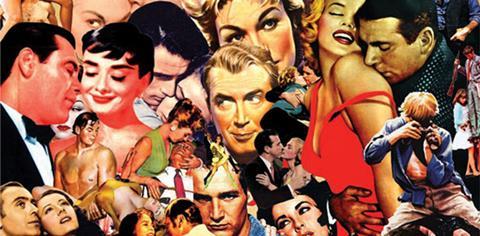Dir: Gyorgy Palfi. Hungary. 2012. 84mins

Christian Marclay has already explored far more elaborately the concept of telling one story or several of them, by using sequences from existing films. And indeed, his celebrated The Clock installation has been extensively displayed in museums all over the world since it was first unveiled in 2010. Hungarian director Gyorgy Palfi attempts to go the same way, using bits and pieces from several hundreds of films and nothing else for the purpose of telling a classic movie romance, replete with all the clichés of the genre.
To the credit of Palfy’s team, the material is smoothly stitched together and the soundtrack is always supportive.
A light-hearted prank for the first ten minutes, Final Cut – Ladies and Gentlemen (Holgyeim es Uraim) soon overstays its welcome, turning into a never-ending movie quiz, occasionally entertaining but mostly exhausting to follow. A curio item for film festivals, it holds little, if any interest, for commercial exploitation, though in this age of downloading someone might latch on the idea of a website collecting all the available film clips in the world, for any client to put together his own film out of them.
Boy meets girl, boy courts girl, boys beats competition for the girl, boy takes girl to bed, boy marries girl… time goes by, husband at work, wife at home, pregnancy on the way, husband fails to react, wife suspicious, husband suspicious, calls wife a slut and goes to war, wife stays home in tears, men die on the front, women desperate at home, but before the end husband comes home, and the two kiss over the finale.
The identity of the partners changes from shot to shot, the same goes for the locations, the language and the exact nature of the relations, for each action there are about twenty or thirty parallel examples from different films, and since royalty problems evidently did not allow for any quote to be over 10 or 15 seconds, you have twenty men walking down the street, thirty couples passionately kissing, fifty couples making love - some conservatively and others going at it as if there is no tomorrow - and so on.
There is no point mentioning all the contributions to this film, they are far too numerous and in any case, short of watching it on an editing device and stopping to note the titles, there is no way you can do justice to them all.
Starting with Avatar, you meet in quick succession anything from Chinatown to Midnight Cowboy, not to mention Breathless, Modern Times, Some Like It Hot, Annie HalI, Once Upon A Time In The West, Ninotchka, Casablanca, The Apartment, Pulp Fiction, and a million others.
If there is a musical scene, it starts with Rita Hayworth putting the blame on Mame and goes all in all directions, including of course Singin’ In The Rain and Saturday Night Fever. When the film goes to war, it’s the jungle set on fire in Apocalypse Now and Kirk Douglas in the trenches for Path of Glory.
The girl could be in one shot Audrey Hepburn, in the next Elisabeth Taylor, then Mia Farrow, Giulietta Massina, Anouk Aimee, Judy Garland or Liza Minelli. The male variety changes from Marlon Brando to Jeff Bridges, and includes Gerard Depardieu, Sam Neil, Vincent Cassel, Jack Nicholson and Tony Leung.
Sorry for the name dropping but that’s the nature of the game here. Not terribly original, to say the least, but lots of it. So much so, that after a while, for anything better to do, the mind drifts and one starts calculating the sources of the films, notices the overwhelming presence of American cinema, the sizeable French contribution, the smattering of Italian, Spanish and Scandinavian films, a few Russian ones but relatively few from Asia.
In small portions this could be a film buff’s delight but at full feature length it is more like a burden. Once the surprise wears off there is no way to enjoy this constant parade of clips rushing by at top speed. Every one of them is so short and there is no chance of relating to any of them, with the viewer being far too busy identifying his past idols and too often thrown off kilter when one of the clips is shown out of context - like Janet Leigh supposedly taking an innocent shower, but since it is in Psycho, one expects at any moment to see the knife coming down on her.
To the credit of Palfy’s team, the material is smoothly stitched together and the soundtrack, using anything from Richard Strauss Thus Spoke Zarathustra from 2001 A Space Odyssey to the soundtrack of In the Mood For Love, is always supportive.
Production companies: TT Filmmuhely, Euro Film, Flimax
International Sales: TT Filmmuhely, ufilmmuhely@t-online.hu
Screenplay: Zsofia Ruttkay, Gyorgy Palfi
Editor: Judit Csako, Karolu Szalai, Nora Richter, Reka Lemhenyi
Music: Balasz Barna





















